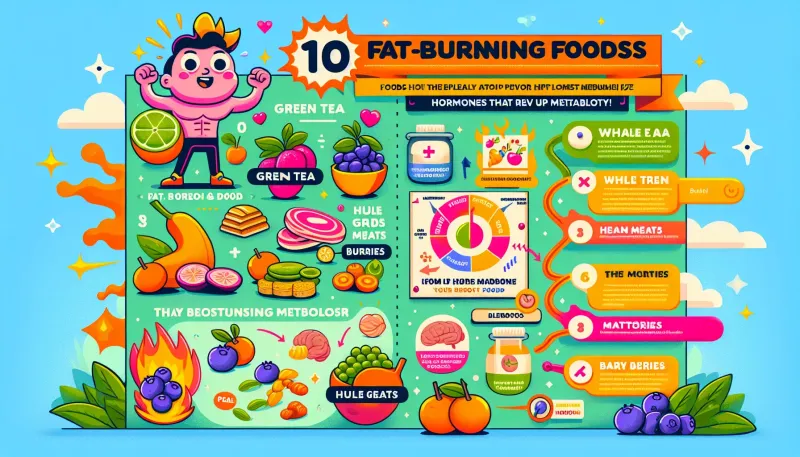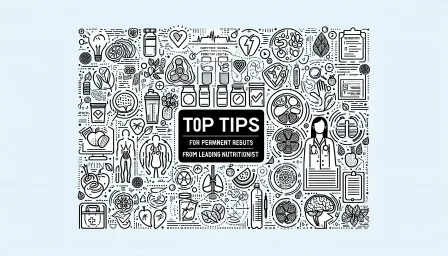Top 10 Fat-Burning Foods and Hormones to Boost Your Metabolism

Discover the top 10 fat-burning foods and hormones that can help boost your metabolism and accelerate your weight loss journey. Informative and well-researched content included.
Keeping your metabolism revved up can make a difference in how your body burns fat and utilizes energy. By incorporating certain fat-burning foods and understanding the key hormones that influence metabolism, you can adopt strategies that promote effective weight loss and a healthier lifestyle. In this article, we explore the top 10 fat-burning foods and hormones that can help boost your metabolism.
Fat-Burning Foods
1. Green Tea
Green tea is renowned for its antioxidant properties and its ability to boost metabolic rate. It contains compounds called catechins, particularly epigallocatechin gallate (EGCG), which increase the rate at which your body burns fat. Regular consumption of green tea can enhance fat oxidation, making it an excellent addition to a fat-burning diet.
2. Coffee
Coffee not only provides an energy boost but also helps in fat burning. Caffeine is a natural stimulant that increases metabolic rate by promoting thermogenesis, the process by which the body generates heat and energy from digesting food. Drinking coffee before workouts can further enhance your exercise performance and fat-burning capabilities.
3. Chili Peppers
Chili peppers contain capsaicin, a compound that has been shown to boost metabolism by increasing the body's heat production and energy expenditure. Capsaicin also helps reduce appetite, making it easier to adhere to a calorie-controlled diet. Adding a pinch of chili pepper to your meals can spice things up while aiding fat loss.
4. Greek Yogurt
Greek yogurt is rich in protein, which is essential for muscle maintenance and growth. High-protein foods have a high thermic effect, meaning they require more energy to digest, thereby boosting metabolism. Additionally, Greek yogurt contains probiotics that support gut health, which is linked to weight management.
5. Apple Cider Vinegar
Apple cider vinegar can help enhance satiety and reduce overall calorie intake. It also has acetic acid, which may increase the body's ability to burn fat. Incorporating apple cider vinegar into your diet—such as adding a tablespoon to a glass of water before meals—may support your weight loss efforts.
6. Lean Meat
Lean meats, such as chicken breast and turkey, are excellent sources of protein, which can boost calorie burning through the thermic effect of food. Consuming lean meats helps preserve muscle mass during weight loss, ensuring that the weight lost is primarily fat.
7. Nuts and Seeds
Nuts and seeds, including almonds, chia seeds, and flaxseeds, are rich in healthy fats, protein, and fiber. These nutrients help increase satiety and stabilize blood sugar levels. Furthermore, the monounsaturated fats in nuts can help boost metabolism and promote fat loss.
8. Berries
Berries, such as blueberries, strawberries, and raspberries, are loaded with fiber, antioxidants, and essential vitamins. The fiber content helps promote a feeling of fullness, while the antioxidants can enhance metabolic functions. Berries also have a low glycemic index, which helps regulate blood sugar levels and reduce fat storage.
9. Whole Grains
Whole grains like oats, quinoa, and brown rice are rich in fiber and complex carbohydrates, which can help stabilize blood sugar levels and prevent insulin spikes that lead to fat storage. Whole grains require more energy to break down compared to processed grains, thereby increasing your metabolic rate.
10. Avocados
Avocados are high in monounsaturated fats, which have been linked to increased fat burning. The healthy fats in avocados can help regulate metabolism by influencing the production of certain fat-burning hormones. Additionally, they are also packed with fiber and essential nutrients that support overall health.
Fat-Burning Hormones
1. Insulin
Insulin is a hormone that regulates carbohydrate and fat metabolism in the body. Proper insulin sensitivity ensures that glucose from the bloodstream is efficiently used for energy, reducing the likelihood of fat storage. Maintaining a balanced diet with low-glycemic foods can enhance insulin sensitivity and support fat loss.
2. Leptin
Leptin is known as the "satiety hormone" because it helps regulate hunger by signaling the brain when you are full. High leptin levels can suppress appetite and increase energy expenditure. However, factors like obesity can lead to leptin resistance. To naturally boost leptin sensitivity, focus on sufficient sleep, reducing stress, and balanced eating.
3. Ghrelin
Ghrelin, often referred to as the "hunger hormone," signals when the body needs food. Keeping ghrelin levels in check is crucial for controlling appetite and avoiding overeating. Consuming high-protein meals and getting adequate sleep can help lower ghrelin levels, aiding in weight management.
4. Adiponectin
Adiponectin is a hormone produced by fat cells that plays a role in regulating glucose levels and fatty acid breakdown. Higher levels of adiponectin are associated with a lower risk of obesity and improved metabolism. Regular physical activity and consuming monounsaturated fats can help increase adiponectin levels.
5. Cortisol
Cortisol, also known as the "stress hormone," can influence weight gain, particularly around the abdominal area, when elevated long-term. Managing stress through practices like mindfulness, exercise, and adequate sleep can help keep cortisol levels in a healthy range, supporting overall metabolic health.
6. Thyroid Hormones
Thyroid hormones, including thyroxine (T4) and triiodothyronine (T3), play a crucial role in regulating metabolism. An efficient thyroid function ensures optimal metabolic rate and energy usage. Incorporating iodine-rich foods like seaweed and maintaining a balanced diet can support thyroid health.
7. Glucagon
Glucagon is a hormone that helps break down stored fat for energy. It works opposite to insulin, raising blood glucose levels when they fall too low. Consuming foods that support steady blood sugar levels, such as high-protein meals, can help stimulate glucagon production and promote fat burning.
8. Growth Hormone
Growth hormone (GH) plays a key role in body composition by stimulating muscle growth and fat metabolism. Higher levels of GH can enhance fat burning and support a lean physique. Engaging in high-intensity interval training (HIIT) and getting enough sleep can naturally boost GH levels.
9. Norepinephrine
Norepinephrine is a hormone and neurotransmitter that increases fat breakdown and boosts metabolism during stress or exercise. Physical activities and consuming foods like green tea and coffee can stimulate the release of norepinephrine, aiding in fat loss efforts.
10. Testosterone
Testosterone, a hormone often associated with males but also present in females, plays a role in muscle mass and fat distribution. Higher testosterone levels can improve muscle mass, leading to a higher metabolic rate and more efficient fat burning. Resistance training and consuming healthy fats can help maintain healthy testosterone levels.
Conclusion
Incorporating fat-burning foods and understanding the role of key hormones in metabolism can significantly enhance your weight loss efforts and overall metabolic health. By making informed dietary choices and adopting lifestyle habits that support hormonal balance, you can create a sustainable approach to achieving your fitness goals.
Remember, it’s always best to consult with a healthcare provider or a dietitian before making any significant changes to your diet or fitness routine.



























